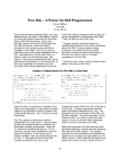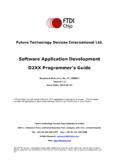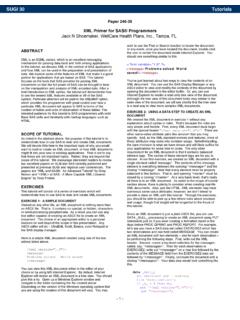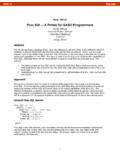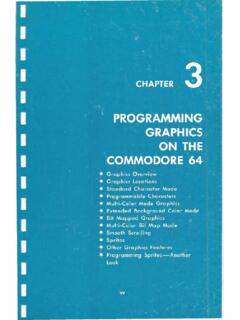Transcription of Generator Tricks For Systems Programmers
1 Copyright (C) 2008, Tricks For Systems ProgrammersDavid at PyCon'20081 Copyright (C) 2008, Introduction2 Generators are cool! But what are they? And what are they good for? That's what this tutorial is aboutCopyright (C) 2008, Me3 I'm a long-time Pythonista First started using Python with version Author : Python Essential Reference Responsible for a number of open source Python-related packages (Swig, PLY, etc.)Copyright (C) 2008, Story4My addiction to generators started innocently enough. I was just a happy Python programmer working away in my secret lair when I got "the call." A call to sort through Terabytes of C++ source code (~800 weekly snapshots of a million line application). That's when I discovered the () function.
2 I knew this wasn't going to end (C) 2008, Story5 I think generators are wicked cool An extremely useful language feature Yet, they still seem a rather exotic I still don't think I've fully wrapped my brain around the best approach to using themCopyright (C) 2008, Complaint6 The coverage of generators in most Python books is lame (mine included) Look at all of these cool examples! Fibonacci Numbers Squaring a list of numbers Randomized sequences Wow! Blow me over!Copyright (C) 2008, Tutorial7 Some more practical uses of generators Focus is " Systems programming" Which loosely includes files, file Systems , parsing, networking, threads, etc. My goal : To provide some more compelling examples of using generators Planting some seedsCopyright (C) 2008, Files8 Files used in this tutorial are available here: Go there to follow along with the examplesCopyright (C) 2008, This isn't meant to be an exhaustive tutorial on generators and related theory Will be looking at a series of examples I don't know if the code I've written is the "best" way to solve any of these problems.
3 So, let's have a discussionCopyright (C) 2008, Details10 There are some later performance numbers Python on OS X All tests were conducted on the following: Mac Pro Ghz Dual-Core Xeon 3 Gbytes RAM WDC WD2500JS-41 SGB0 Disk (250G) Timings are 3-run average of 'time' commandCopyright (C) 2008, I11 Introduction to Iterators and GeneratorsCopyright (C) 2008, As you know, Python has a "for" statement You use it to loop over a collection of items12>>> for x in [1,4,5,10]:.. print x,..1 4 5 10>>> And, as you have probably noticed, you can iterate over many different kinds of objects (not just lists)Copyright (C) 2008, over a Dict If you loop over a dictionary you get keys13>>> prices = { 'GOOG'.}
4 'AAPL' : ,.. 'YHOO' : }..>>> for key in prices:.. print >>>Copyright (C) 2008, over a String If you loop over a string, you get characters14>>> s = "Yow!">>> for c in s:.. print !>>>Copyright (C) 2008, over a File If you loop over a file you get lines15>>> for line in open(" "):.. print line,.. Real Programmers write in FORTRAN Maybe they do now, in this decadent era of Lite beer, hand calculators, and "user-friendly" software but back in the Good Old Days, when the term "software" sounded funny and Real Computers were made out of drums and vacuum tubes, Real Programmers wrote in machine code. Not FORTRAN. Not RATFOR.
5 Not, even, assembly language. Machine Code. Raw, unadorned, inscrutable hexadecimal numbers. (C) 2008, Iterables Many functions consume an "iterable" object Reductions:16sum(s), min(s), max(s) Constructorslist(s), tuple(s), set(s), dict(s) in operatoritem in s Many others in the libraryCopyright (C) 2008, Protocol The reason why you can iterate over different objects is that there is a specific protocol17>>> items = [1, 4, 5]>>> it = iter(items)>>> ()1>>> ()4>>> ()5>>> ()Traceback (most recent call last): File "<stdin>", line 1, in <module>StopIteration>>>Copyright (C) 2008, Protocol An inside look at the for statementfor x in obj: # statements Underneath the covers_iter = iter(obj) # Get iterator objectwhile 1: try.
6 X = () # Get next item except StopIteration: # No more items break # statements .. Any object that supports iter() and next() is said to be "iterable."18 Copyright (C) 2008, Iteration User-defined objects can support iteration Example: Counting >>> for x in countdown(10):.. print x,..10 9 8 7 6 5 4 3 2 1>>>19 To do this, you just have to make the object implement __iter__() and next()Copyright (C) 2008, Iterationclass countdown(object): def __init__(self,start): = start def __iter__(self): return self def next(self): if <= 0: raise StopIteration r = -= 1 return r20 Sample implementationCopyright (C) 2008, Example Example use:>>> c = countdown(5)>>> for i in c.
7 Print i,..5 4 3 2 1>>>21 Copyright (C) 2008, Commentary There are many subtle details involving the design of iterators for various objects However, we're not going to cover that This isn't a tutorial on "iterators" We're talking about (C) 2008, A Generator is a function that produces a sequence of results instead of a single value23def countdown(n): while n > 0: yield n n -= 1>>> for i in countdown(5):.. print i,..5 4 3 2 1>>> Instead of returning a value, you generate a series of values (using the yield statement)Copyright (C) 2008, Behavior is quite different than normal func Calling a Generator function creates an Generator object. However, it does not start running the countdown(n): print "Counting down from", n while n > 0: yield n n -= 1>>> x = countdown(10)>>> x< Generator object at 0x58490>>>>Notice that no output was producedCopyright (C) 2008, Functions The function only executes on next()>>> x = countdown(10)>>> x< Generator object at 0x58490>>>> ()Counting down from 1010>>> yield produces a value, but suspends the function Function resumes on next call to next()>>> ()9>>> ()8>>>Function starts executing here25 Copyright (C) 2008, Functions When the Generator returns, iteration stops>>> ()1>>> ()Traceback (most recent call last): File "<stdin>", line 1, in ?
8 StopIteration>>>26 Copyright (C) 2008, Functions A Generator function is mainly a more convenient way of writing an iterator You don't have to worry about the iterator protocol (.next, .__iter__, etc.) It just works27 Copyright (C) 2008, vs. Iterators A Generator function is slightly different than an object that supports iteration A Generator is a one-time operation. You can iterate over the generated data once, but if you want to do it again, you have to call the Generator function again. This is different than a list (which you can iterate over as many times as you want)28 Copyright (C) 2008, Expressions A generated version of a list comprehension>>> a = [1,2,3,4]>>> b = (2*x for x in a)>>> b< Generator object at 0x58760>>>> for i in b: print b.
9 2 4 6 8>>> This loops over a sequence of items and applies an operation to each item However, results are produced one at a time using a generator29 Copyright (C) 2008, Expressions Important differences from a list comp. Does not construct a list. Only useful purpose is iteration Once consumed, can't be reused30 Example:>>> a = [1,2,3,4]>>> b = [2*x for x in a]>>> b[2, 4, 6, 8]>>> c = (2*x for x in a)< Generator object at 0x58760>>>> Copyright (C) 2008, Expressions General syntax(expression for i in s if cond1 for j in t if cond2 .. if condfinal)31 What it means for i in s: if cond1: for j in t: if cond2: .. if condfinal: yield expressionCopyright (C) 2008, Note on Syntax The parens on a Generator expression can dropped if used as a single function argument Example:sum(x*x for x in s)32 Generator expressionCopyright (C) 2008, We now have two basic building blocks Generator functions:33def countdown(n): while n > 0.
10 Yield n n -= 1 Generator expressionssquares = (x*x for x in s) In both cases, we get an object that generates values (which are typically consumed in a for loop)Copyright (C) 2008, 234 Processing Data Files(Show me your Web Server Logs)Copyright (C) 2008, Problem35 Find out how many bytes of data were transferred by summing up the last column of data in this Apache web server - .. "GET /ply/ " 200 - .. "GET " 404 - .. "GET / " 200 - .. "GET / " 200 - .. "GET / " 200 - .. "GET " 200 4447Oh yeah, and the log file might be huge (Gbytes)Copyright (C) 2008, Log File Each line of the log looks like this:36bytestr = (None,1)[1] - .. "GET / " 200 97238 The number of bytes is the last column It's either a number or a missing value (-).



